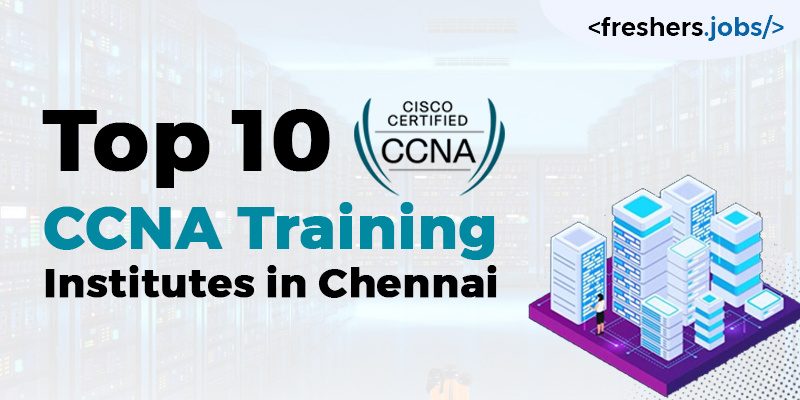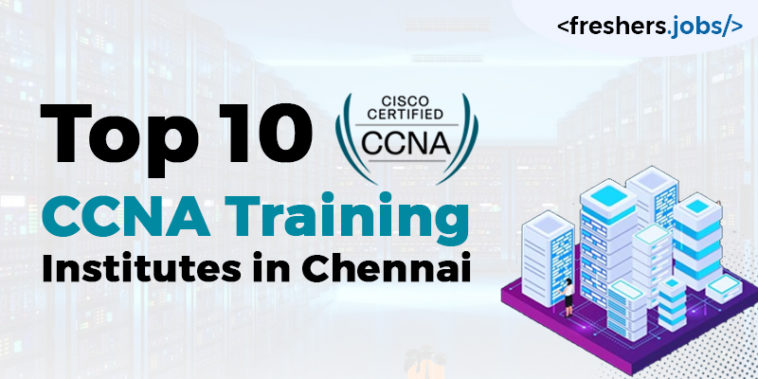In our rapidly evolving digital landscape, where connectivity is the heartbeat of industries, the demand for skilled and certified professionals is more critical than ever. Among the myriad of certifications available, the Cisco Certified Network Associate (CCNA) stands out as a cornerstone in building a solid foundation for networking expertise. As businesses increasingly adopt digital transformation, the necessity for resilient and secure networks becomes imperative.

Whether it’s ensuring seamless communication, safeguarding sensitive data, or optimizing the performance of cloud-based applications, the CCNA certification has emerged as a pivotal credential for professionals seeking to navigate the complex networking world. CCNA certification guides professionals toward success in an era of connectivity, collaboration, and constant innovation. We will explore the Top 10 CCNA Institutes in Chennai, its role, merits, key aspects, and job opportunities.
Following are the Top 10 Training Institutes for CCNA Course in Chennai.
- FITA Academy
- Simplilearn
- Besant Technologies
- Credo Systemz
- Greens Technologys
- Softlogic Systems
- ACTE
- Systech Group
- Network Rhinos
- KaaShiv Infotech
1. FITA Academy
FITA Academy, a prominent training institute, offers a comprehensive array of more than 120 courses, both online and offline. Renowned for delivering vital technical and professional certifications, the academy consistently holds a prominent position in the industry. With a team of more than 1,000 trainers possessing decades of experience, the institute has positively influenced the learning journeys of more than 75,000 individuals. Having established multiple branches in Bangalore, Pondicherry, Coimbatore, and Madurai, the academy underscores its dedication to providing top-notch training. This strategic expansion ensures that individuals in diverse regions have access to high-quality training opportunities.
Why choose CCNA Classes in Chennai at FITA Academy?
FITA Academy presents comprehensive CCNA Classes in Chennai, encompassing fundamental to advanced-level concepts to instill extensive knowledge in Networking Fundamentals, Routers and Switches, Network Access, IP Connectivity, IP services, Security Fundamentals, Firewalls, and Automation, covering CRUD, HTTP verbs, and Data Encoding. The course structure incorporates two real-time capstone projects, elevating the practical learning experience. Ensuring both affordability and quality, FITA Academy makes the course accessible to a broad spectrum of learners. The institute offers flexibility in batch schedules, accommodating both weekend and weekday class options. Furthermore, successful participants are eligible for placement support upon completing their training.
Customized Curriculum for CCNA Course in Chennai
The CCNA curriculum meticulously covers core principles, exploring Network Components, Topology Architectures, Physical Interfaces, TCP vs UDP, IPv4 Addressing, IPv6 Addressing, Wireless Principles, VLAN Configuration, LLDP, and CISCO Discovery Protocols. Students gain expertise in Rapid PVST+, Cisco Wireless Architectures, WLAN Configuration, IP Connectivity, Routing, First Hop Redundancy, IP Services, NAT Configuration, DNS and DHCP roles, Security Fundamentals, Device Access Control, VPNs, Access Control Lists, Layer 2 Security, Authentication, Wireless Security Protocols, and WPA2 PSK Configuration. Advanced topics include Automation, Controller-based Networking, North-Bound and South-Bound APIs, Traditional Campus Device Management, REST-based APIs, and JSON-Encoded data interpretation. This comprehensive curriculum ensures a deep understanding of CCNA principles, preparing students for real-world networking challenges.
Expert Trainers for the CCNA Institute in Chennai
In FITA Academy’s CCNA Training in Chennai, you will be guided with proficient trainers with extensive hands-on experience in the industry. These instructors are dedicated to imparting theoretical knowledge while sharing valuable real-world insights with students. They are pivotal in keeping learners abreast of the latest industry trends, ensuring thorough preparation for this dynamic field.
Project Presentation Sessions
A distinctive aspect of FITA Academy’s CCNA Course in Chennai is the inclusion of project presentation sessions. Recognizing the significance of practical experience in mastering CCNA and preparing for a successful career, these sessions enable students to apply acquired knowledge and principles in real-world scenarios, providing valuable hands-on exposure.
Complimentary Placement Sessions
FITA Academy is devoted to providing extensive CCNA Training in Chennai that goes beyond the classroom. The institute prepares students for the competitive job market through complimentary placement sessions covering essential aspects such as resume building, refining interview skills, job placement assistance, and career guidance. The Placement session is meticulously designed and aims to help students achieve their career objectives. With a vast network of 1,500+ partner companies, FITA Academy facilitates job placements for graduates, offering diverse opportunities within the industry. This extensive network ensures students have access to promising career prospects, facilitating a smooth and successful transition into the professional world.
2. Simplilearn
Simplilearn is a reputable online platform that provides a flexible CCNA Course covering fundamental to advanced concepts. Despite the Institute’s comprehensive offerings, the primary emphasis on online courses may limit direct interaction between learners and trainers, which comes with a higher cost.
3. Besant Technologies
Besant Technologies specializes in CCNA Classes for both beginners and advanced learners and offers a curriculum with valuable learning materials. However, course costs may be relatively higher compared to other institutes.
4. Credo Systemz
Credo Systemz focuses on delivering CCNA Courses to enhance skills and provide valuable industry knowledge. However, it might not be the preferred choice for those seeking a more in-depth learning experience.
5. Greens Technologys
Greens Technologys offers comprehensive CCNA Classes with real-time assistance. Despite providing extensive facilities, their course cost might be relatively expensive compared to other institutes.
6. Softlogic Systems
Softlogic Systems provides specialized CCNA Courses tailored to industry-specific requirements. However, their placement support might not be as comprehensive compared to some other institutes.
7. ACTE
ACTE offers an extensive CCNA course, providing essential skills. However, this course might not be the ideal choice for learners seeking a more extensive and in-depth learning experience compared to other institutes.
8. Systech Group
Systech Group specializes in providing tailored CCNA Classes for industry-specific needs. However, their practical training aspect may not be as comprehensive compared to other institutes.
9. Network Rhinos
Network Rhinos specializes in providing CCNA Classes, covering comprehensive concepts. While they offer these benefits, their level of placement support might be relatively less extensive compared to certain other institutes.
10. KaaShiv Infotech
KaaShiv Infotech offers CCNA courses with a focus on imparting essential skills. However, it’s important to note that their practical training component may not be as extensive as some other institutes.
Freshers Jobs carefully selected these institutes after thorough research, taking into account factors such as brand reputation, student feedback, and a proven track record of student achievements.
Role of CCNA in Modern Business
The Cisco Certified Network Associate (CCNA) certification plays a crucial role in the business world by addressing the increasing demand for skilled networking professionals. The CCNA certification is instrumental in addressing the networking needs of modern businesses. Its relevance extends to network infrastructure, security, cloud integration, remote work support, career advancement, vendor-neutral expertise, adaptability to technological changes, and global recognition, making it a valuable asset in the contemporary business landscape. We will explore its merits, key components, and job opportunities in the upcoming topics.
What is CCNA?
CCNA stands for Cisco Certified Network Associate. It is a widely recognized and globally respected certification offered by Cisco Systems, one of the leading companies in the networking and information technology industry. The CCNA certification is designed to validate the foundational skills and knowledge required to operate, troubleshoot, and secure enterprise-level networks. CCNA is often considered a foundational certification and is suitable for individuals beginning their careers in networking or those looking to validate their existing networking skills. It’s also valuable for professionals in related fields, such as system administrators, who want to understand networking principles better.
Merits of CCNA
- Industry Recognition: CCNA is a globally recognized certification that holds prestige in the IT and networking industry. Achieving CCNA status demonstrates a foundational understanding of networking concepts and technologies.
- Foundational Knowledge: CCNA covers a broad range of networking topics, providing individuals with a solid foundation in networking principles, protocols, and technologies. This foundational knowledge is essential for building more advanced networking skills.
- Career Advancement: CCNA certification enhances career opportunities by making individuals more marketable to employers. It is often a prerequisite for more advanced Cisco certifications and other higher-level networking roles.
- Validation of Skills: CCNA certification validates an individual’s skills in configuring, managing, and troubleshooting Cisco networks. This validation is valuable for professionals seeking to demonstrate their competence in networking.
- Networking Competence: CCNA covers routing and switching technologies, IP addressing, network security, wireless networking, and more. This comprehensive coverage ensures that certified individuals have a well-rounded understanding of key networking concepts.
- Global Recognition: CCNA is recognized internationally, allowing certified professionals to pursue job opportunities in various regions and work on networking projects with a global scope.
- Preparation for Advanced Certifications: CCNA serves as a stepping stone for individuals interested in pursuing more advanced Cisco certifications, such as CCNP (Cisco Certified Network Professional) or specialized certifications in security, wireless, or data center networking.
- Employability: CCNA certification enhances employability, making individuals more attractive to employers seeking skilled networking professionals. It opens doors to network administrator, support engineer, or technical specialist roles.
- Adaptability to Evolving Technologies: CCNA is regularly updated to reflect changes in networking technologies. This ensures that certified individuals stay current with industry trends and are equipped to handle the challenges of evolving technologies.
- Community and Resources: CCNA certification provides access to a community of certified professionals and valuable resources. Networking with peers and accessing Cisco’s educational materials can contribute to ongoing professional development.
- Hands-on Experience: CCNA often includes practical, hands-on labs and simulations, allowing individuals to apply their knowledge in real-world scenarios. This practical experience is invaluable in building confidence and competence.
Key Components of CCNA
Network Fundamentals
- OSI Model: Delve into the seven layers of the OSI model, understanding the purpose and functions of each layer. Explore how data is encapsulated and de-encapsulated as it traverses the network.
- TCP/IP Stack: Explore the TCP/IP protocol suite, examining the functionalities of key protocols like TCP, UDP, IP, and ICMP. Understand how these protocols enable communication across diverse network environments.
- Protocols: In addition to TCP/IP, explore other essential protocols, such as ARP (Address Resolution Protocol), DHCP, and DNS. Gain insights into how these protocols facilitate address resolution, dynamic host configuration, and domain name resolution.
- Basic Network Infrastructure: Explore the components of a network infrastructure, including routers, switches, hubs, and repeaters. Understand their roles in facilitating communication within a network.
Routing and Switching
- Routing Protocols: Delve more into protocols like OSPF (Open Shortest Path First) and EIGRP (Enhanced Interior Gateway Routing Protocol). Learn how routers exchange routing information and make dynamic routing decisions.
- VLANs (Virtual LANs): Understand the concept of VLANs and their role in logically segmenting a network. Explore how VLANs enhance network efficiency and security.
- Switch Operation: Study the operations of network switches, including MAC address learning, VLAN assignment, and frame forwarding. Explore switch configurations for optimal network performance.
IP Addressing and Subnetting
- IP Address Fundamentals: Further explore IP addressing, distinguishing between IPv4 and IPv6. Learn about address classes, reserved addresses, and the structure of IPv6 addresses.
- Subnetting: Delve into subnetting techniques, mastering the ability to create subnets and allocate IP addresses efficiently. Understand subnet masks, CIDR notation, and the impact of subnetting on network design.
Wireless Networking
- Wireless Configuration: Explore the configuration of wireless networks, including setting up access points, defining SSIDs, and implementing security measures such as WPA (Wi-Fi Protected Access).
- Wireless Standards: Understand wireless standards like 802.11a/b/g/n/ac and explore their differences. Examine how these standards impact network performance and coverage.
Security Fundamentals
- Access Control Lists (ACLs): Dive into implementing ACLs to control traffic flow and enhance network security. Explore standard and extended ACLs, understanding their application in different scenarios.
- VPNs (Virtual Private Networks): Explore the principles of VPNs, including tunneling protocols and encryption methods. Understand how VPNs secure data communication over public networks.
- Securing Network Devices: Study methods for securing network devices, including configuring secure management access, using SSH (Secure Shell), and implementing physical security measures.
Network Access Control
- Access Controls: Further explore access controls, including the implementation of role-based access controls (RBAC) and the principle of least privilege.
- Password Policies: Examine password policies, including complexity requirements, expiration periods, and account lockout policies. Understand how robust password policies contribute to network security.
Wide Area Networking (WAN) Technologies
- PPP (Point-to-Point Protocol): Explore PPP, a data link layer protocol, to establish a direct connection between two nodes. Understand its application in WAN connectivity.
- Frame Relay: Dive into Frame Relay, a WAN protocol for efficient data transmission over a shared network. Explore its configuration and troubleshooting.
Network Management
- Network Monitoring: Explore network monitoring tools and techniques, including SNMP (Simple Network Management Protocol), for gathering network statistics and performance data.
- Troubleshooting Tools: Learn about common troubleshooting tools like ping, traceroute, and packet analyzers. Understand how to use these tools to diagnose and resolve network issues.
IPv6
- IPv6 Address Configuration: Explore IPv6 addressing, including stateless and stateful address configuration. Understand the benefits of IPv6 over IPv4 and the considerations for dual-stack implementations.
Quality of Service (QoS)
- QoS Mechanisms: Dive into QoS mechanisms such as traffic shaping and policing. Explore how QoS ensures optimal network performance by prioritizing critical data traffic.
Infrastructure Services
- DHCP (Dynamic Host Configuration Protocol): Delve deeper into DHCP, understanding its role in dynamically assigning IP addresses to network devices. Explore DHCP relay agents and DHCP options.
- DNS (Domain Name System): Examine DNS, the system tasked with changing domain names into IP addresses. Understand the hierarchy of DNS and its role in Internet communication.
Network Automation and Programmability
- Ansible and APIs: Explore network automation using Ansible, a popular tool. Understand the basics of APIs and how they enable programmability in network devices.
Troubleshooting
- Problem Identification: Hone troubleshooting skills, focusing on identifying and isolating network issues. Explore methodologies for systematic problem-solving in diverse network environments.
Network Design and Architecture
- Scalability: Understand principles of network scalability, considering factors such as device capacity, bandwidth, and addressing schemes. Explore design considerations for scalable networks.
- Redundancy and High Availability: Explore strategies for achieving network redundancy and high availability, including redundant links, devices, and failover mechanisms.
Security Best Practices
- Firewall Configuration: Dive into firewall configuration, understanding how firewalls enhance network security by controlling incoming and outgoing traffic.
- Intrusion Prevention Systems (IPS): Explore the principles of IPS, understanding how these systems detect and prevent malicious network activity. Consider best practices for implementing IPS in a network.
Job Opportunities after CCNA Certification
- Network Technician: This entry-level role focuses on providing support for network infrastructure, troubleshooting connectivity issues, and assisting in configuring network devices.
- Technical Support Specialist: Technical Support Specialists involved in providing technical assistance to end-users, addressing network-related concerns, and resolving issues related to network connectivity.
- Help Desk Analyst: A Help Desk Analyst provides first-line support, assisting users with technical issues, including network-related problems. Involves troubleshooting and resolving user-reported network concerns.
- Network Administrator: They are responsible for the day-to-day operations of a network, including configuration, maintenance, and troubleshooting. This may involve managing network security and implementing upgrades.
- Systems Administrator: A Systems Administrator manages and maintains an organization’s computer systems, including servers and network infrastructure. In this role, CCNA-certified professionals may handle networking and systems administration tasks.
- Network Engineer: Network Engineers are involved in designing and implementing network solutions, optimizing performance, and troubleshooting complex network issues. Network engineers may also work on projects to expand or upgrade existing networks.
- IT Support Specialist II: An IT Support Specialist II job is an advanced support role involving more complex troubleshooting and problem resolution. May also contribute to the planning and implementation of IT projects.
- Senior Network Administrator: A Senior Network Administrator is a leader in managing and overseeing the organization’s network infrastructure. Involves strategic planning, implementing advanced network solutions, and mentoring junior staff.
- Network Architect: Network Architects design and plan an organization’s network structure. This role involves high-level decision-making, considering business needs, scalability, and security requirements.
- IT Manager/Director: An IT Manager/Director manages the overall IT operations of an organization, including networks. Responsibilities may include budgeting, strategic planning, and overseeing a team of IT professionals.
- Network Security Analyst: Network Security Analysts secure an organization’s network infrastructure. Involves implementing security measures, monitoring for threats, and responding to security incidents.
- Wireless Communications Engineer: Wireless Communications Engineers specializes in designing, implementing, and managing wireless communication systems within organizations. This role focuses on optimizing wireless network performance.
- VoIP Engineer/Architect: VoIP Engineer/Architects specializes in voice over IP (VoIP) technology, designing and implementing voice communication systems over IP networks. This may involve integrating VoIP solutions with existing infrastructure.
- Data Center Manager: Data Center Managers manage the operations of a data center, including servers, storage systems, and networking equipment. This role needs a deep understanding of data center infrastructure.
- IT Consultant: An IT Consultant provides advisory services to organizations on various IT matters, including network design, optimization, and security. May work independently or as part of a consulting firm.
- Chief Information Officer (CIO): A Chief Information Officer (CIO) is a leadership role at the executive level, overseeing the entire IT department, including network operations. Responsibilities include aligning IT strategy with business goals.
The CCNA, also known as Cisco Certified Network Associate certification has proven indispensable in our digital era’s dynamic landscape. As businesses undergo rapid digital transformation, the demand for skilled professionals with a strong foundation in networking is at an all-time high. CCNA, recognized as a cornerstone certification, not only guides students with the necessary knowledge and skills but also positions them as valuable contributors to the evolving connectivity needs of industries. We discussed the Top 10 CCNA Training Institutes in Chennai. We also examined the role of CCNA Certification in today’s business world, its significance, key components and available job opportunities.




